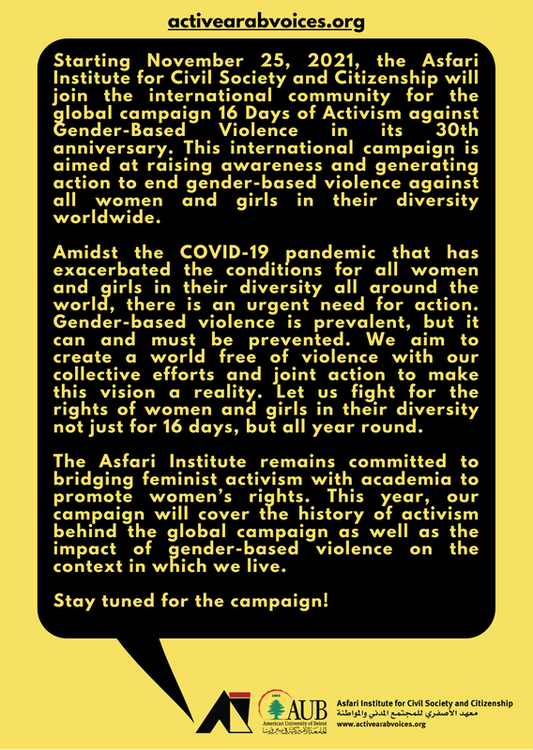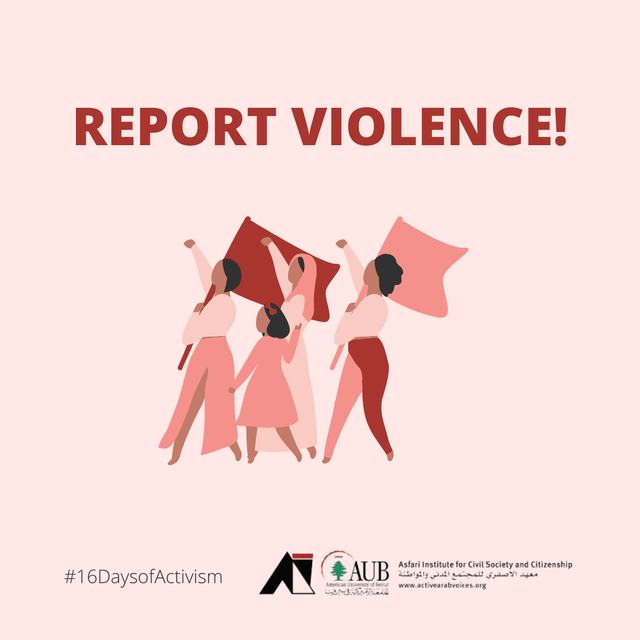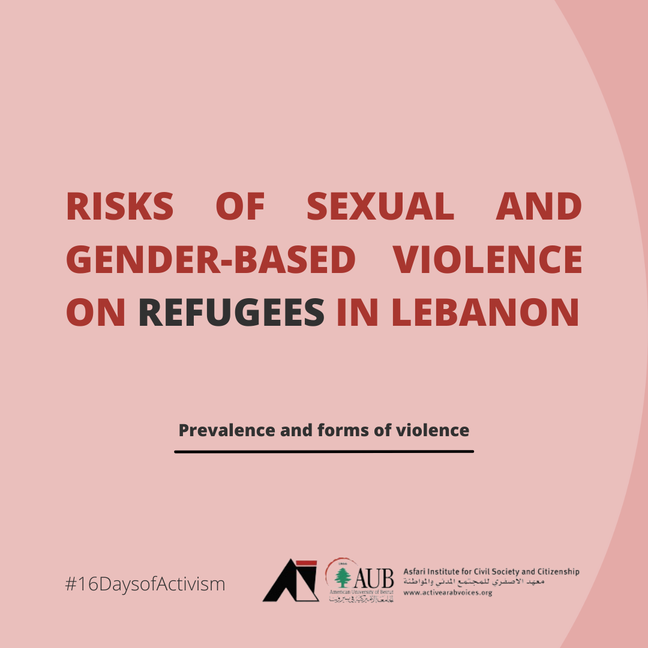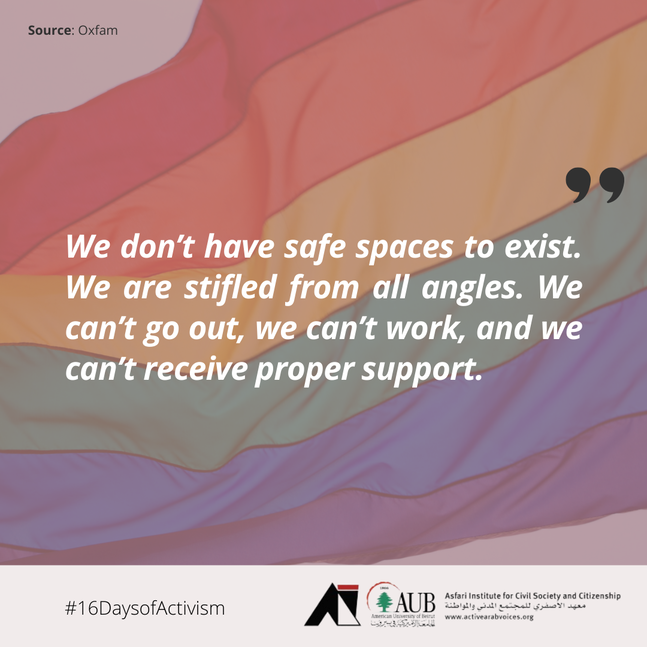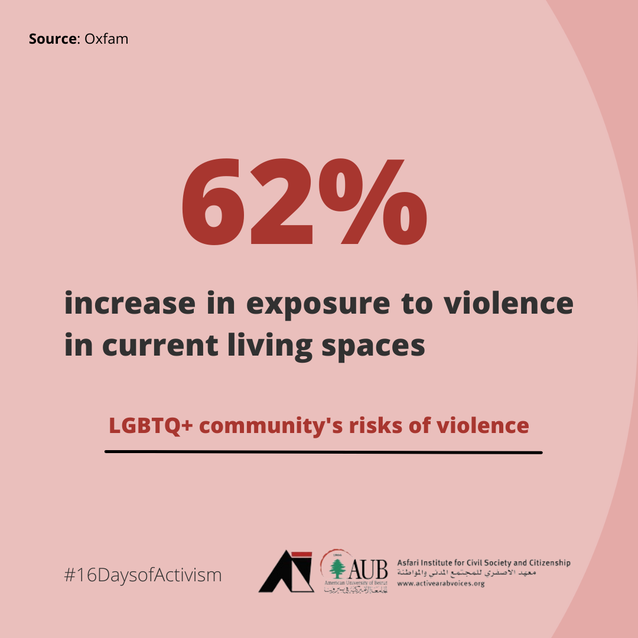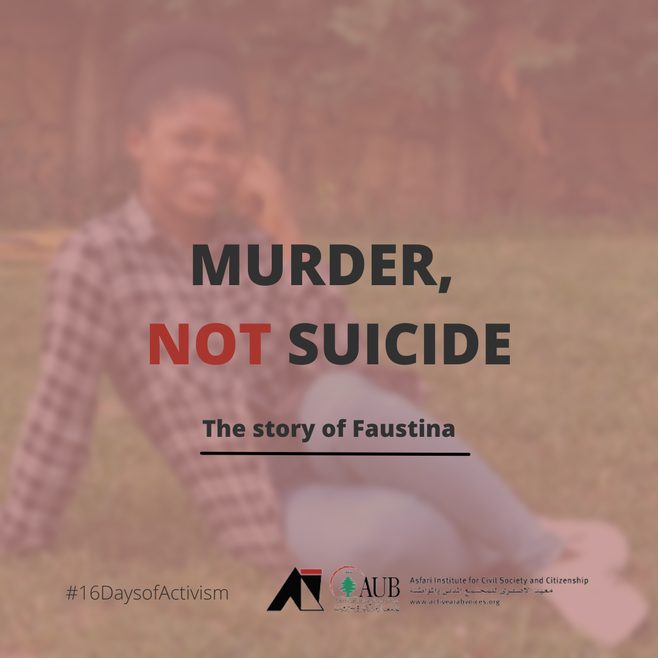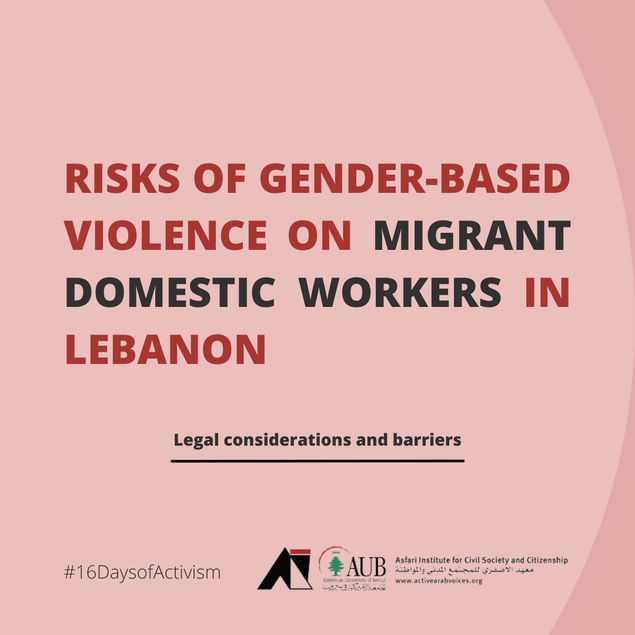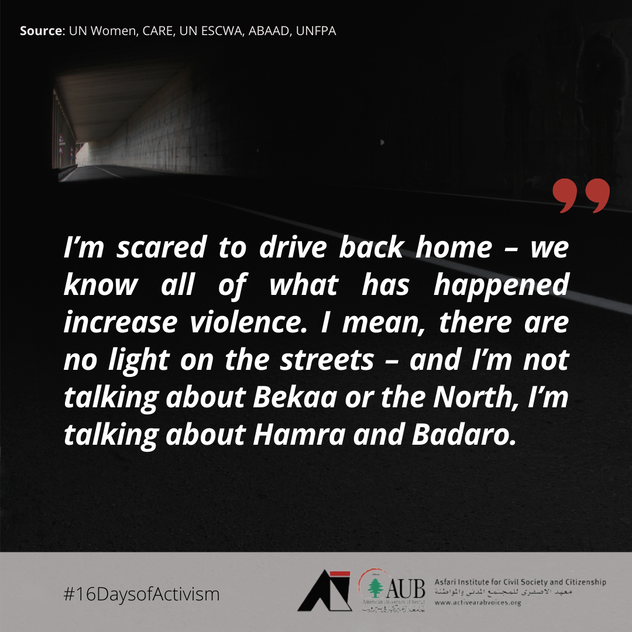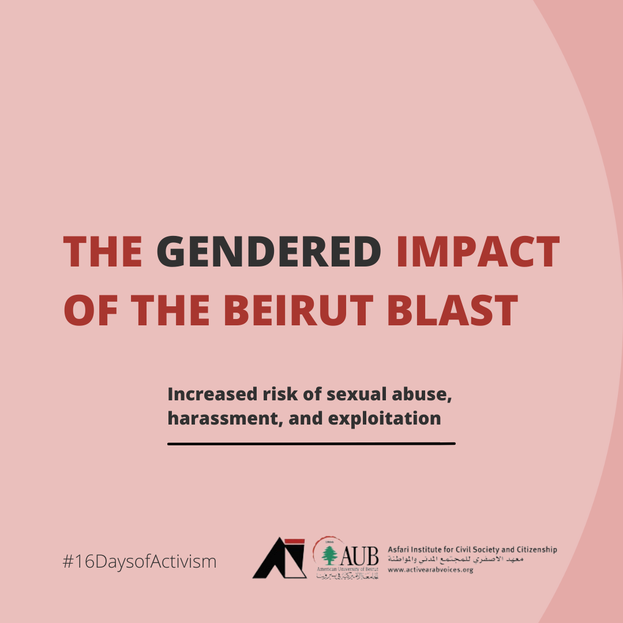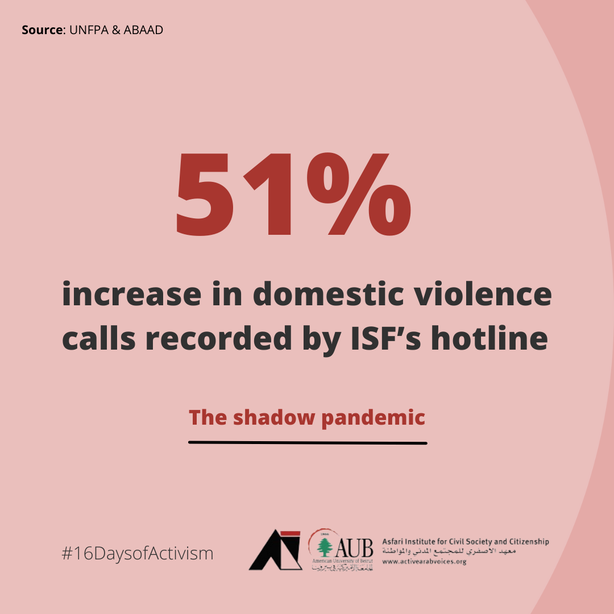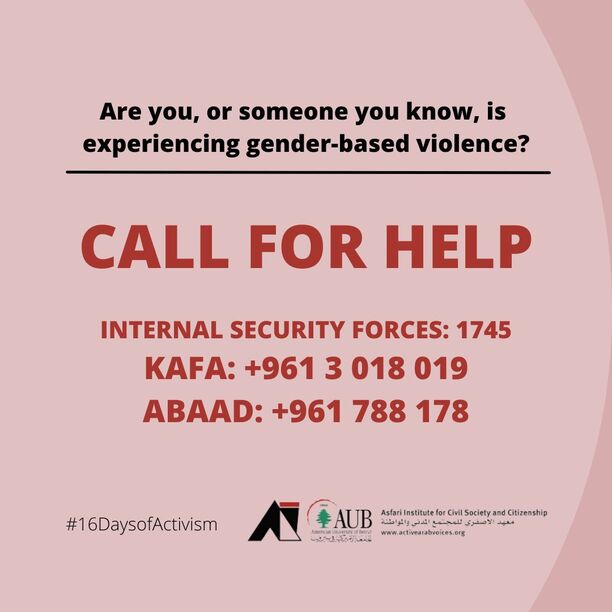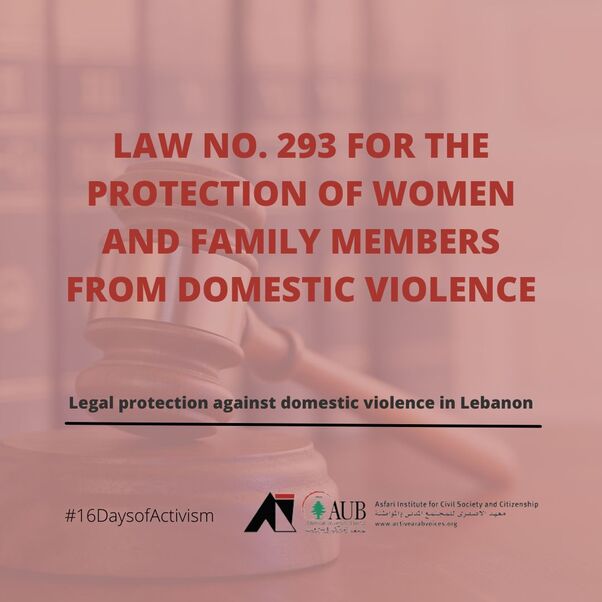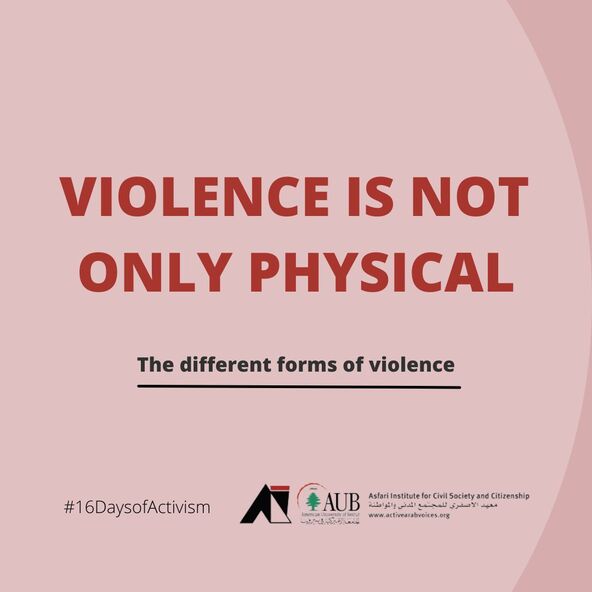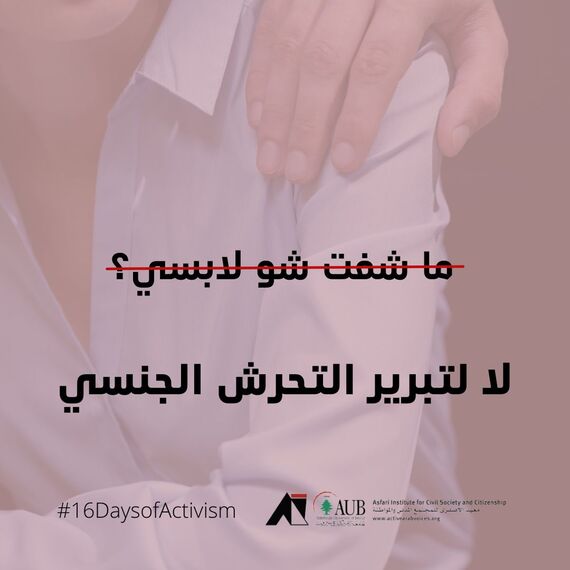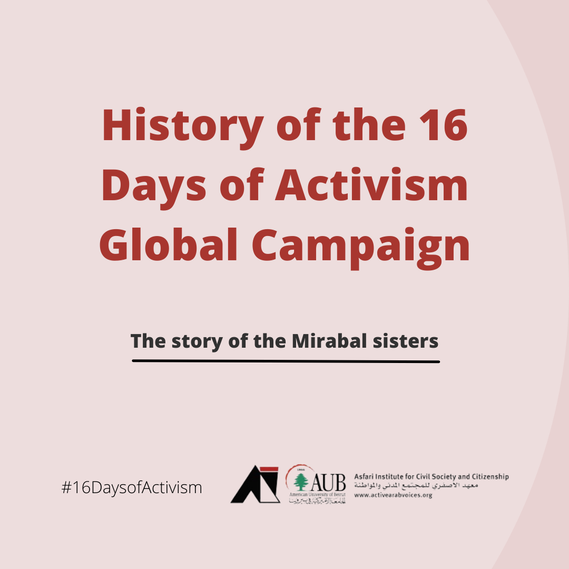16 Days of Activism
The Global Campaign Against Gender-Based Violence
Day 16 of our Regional Campaign
Day 16 | Rejection of ALL forms of violence
As evident in our #16DaysofActivism campaign, there are different forms of violence, some of which may be too subtle to notice.
But violence is everywhere. It is in private and public spaces, in the family and in the community.
Violence affects all women and girls of all ages and in all social classes, regardless of race, nationality, and religion.
Wherever it may be and whoever it may be against, we must reject ALL forms of violence. If you experience or witness violence, make sure to report it.
Let us reject it not just for 16 Days, but every single day.
#16DaysofActivism
As evident in our #16DaysofActivism campaign, there are different forms of violence, some of which may be too subtle to notice.
But violence is everywhere. It is in private and public spaces, in the family and in the community.
Violence affects all women and girls of all ages and in all social classes, regardless of race, nationality, and religion.
Wherever it may be and whoever it may be against, we must reject ALL forms of violence. If you experience or witness violence, make sure to report it.
Let us reject it not just for 16 Days, but every single day.
#16DaysofActivism
Day 15 of our Regional Campaign
Day 15 | Risks of GBV on Refugees
Refugee and displaced women have been at a heightened risk of experiencing sexual and gender-based violence (SGBV) throughout their lifetime, which was further exacerbated by the COVID-19 pandemic.
Recent data suggest that Syrian refugee women in Lebanon most commonly experience sexual harassment, abuse, exploitation, physical abuse, and emotional abuse. However, displaced women often do not seek help due to fear or lack of access to critical social services.
Source: Diab, J. L., Naal, H. (2020). On Hierarchy of Emergencies: SGBV and Mental Health among Refugees in Times of COVID-19. AUB Global Health Institute.
Displacement often carries with it other challenges. Tomorrow, we will explore the long-term gendered effect of armed conflict in Syria on vulnerable groups in a roundtable discussion. This event, entitled “The Disproportionate Impact of the Syrian Crisis: A Feminist Approach to Transformative Reparations”, was organized in collaboration with Issam Fares Institute on the occasion of International Human Rights Day.
Make sure to join us tomorrow in our event!
#16DaysofActivism
Refugee and displaced women have been at a heightened risk of experiencing sexual and gender-based violence (SGBV) throughout their lifetime, which was further exacerbated by the COVID-19 pandemic.
Recent data suggest that Syrian refugee women in Lebanon most commonly experience sexual harassment, abuse, exploitation, physical abuse, and emotional abuse. However, displaced women often do not seek help due to fear or lack of access to critical social services.
Source: Diab, J. L., Naal, H. (2020). On Hierarchy of Emergencies: SGBV and Mental Health among Refugees in Times of COVID-19. AUB Global Health Institute.
Displacement often carries with it other challenges. Tomorrow, we will explore the long-term gendered effect of armed conflict in Syria on vulnerable groups in a roundtable discussion. This event, entitled “The Disproportionate Impact of the Syrian Crisis: A Feminist Approach to Transformative Reparations”, was organized in collaboration with Issam Fares Institute on the occasion of International Human Rights Day.
Make sure to join us tomorrow in our event!
#16DaysofActivism
Day 14 of our Regional Campaign
Day 14 | Lack of Safe Spaces for Queer Communities in Lebanon
The compounded effects of the Beirut Blast, the COVID-19 pandemic, and the economic crisis caused the LGBTQI+ community to be hardest hit among the vulnerable groups in Lebanon with few safe spaces left in the country.
Source: Aouad, N., Abed, D. (2021). Queer Community in Crisis: Trauma, Inequality & Vulnerability. Oxfam.
#16DaysofActivism
The compounded effects of the Beirut Blast, the COVID-19 pandemic, and the economic crisis caused the LGBTQI+ community to be hardest hit among the vulnerable groups in Lebanon with few safe spaces left in the country.
Source: Aouad, N., Abed, D. (2021). Queer Community in Crisis: Trauma, Inequality & Vulnerability. Oxfam.
#16DaysofActivism
Day 13 of our Regional Campaign
Day 13 | Risks of GBV on Queer Folks
The risks of violence for the LGBTQI+ community in Lebanon have exacerbated tremendously due to recent events, particularly the Beirut Blast, the COVID-19 pandemic, and economic crisis.
Many LGBTQI+ community members were forced to leave neighborhoods in which they felt relatively safe and accepted, either because their homes were completely destroyed after the blast or because they can no longer afford rent due to the economic crisis, which was exacerbated by the COVID-19 pandemic.
As such, queer folks had to relocated to more affordable places outside Beirut and Mount Lebanon where their sexual orientation and gender identity exposed them to increased risk of discrimination and violence. Indeed, a 62% increased exposure to violence in current living spaces was reported by LGBTQI+ members.
Source: Aouad, N., Abed, D. (2021). Queer Community in Crisis: Trauma, Inequality & Vulnerability. Oxfam.
#16DaysofActivism
The risks of violence for the LGBTQI+ community in Lebanon have exacerbated tremendously due to recent events, particularly the Beirut Blast, the COVID-19 pandemic, and economic crisis.
Many LGBTQI+ community members were forced to leave neighborhoods in which they felt relatively safe and accepted, either because their homes were completely destroyed after the blast or because they can no longer afford rent due to the economic crisis, which was exacerbated by the COVID-19 pandemic.
As such, queer folks had to relocated to more affordable places outside Beirut and Mount Lebanon where their sexual orientation and gender identity exposed them to increased risk of discrimination and violence. Indeed, a 62% increased exposure to violence in current living spaces was reported by LGBTQI+ members.
Source: Aouad, N., Abed, D. (2021). Queer Community in Crisis: Trauma, Inequality & Vulnerability. Oxfam.
#16DaysofActivism
Day 12 of our Regional Campaign
Day 12 | The Story of Faustina Fay
Faustina, a migrant domestic worker from Ghana, called for help hours before she was found dead in the parking of her employer’s home in Beirut on March 14, 2020. Despite her attempts to seek help through various means, the forensic doctor reported that there were marks of physical assault on her body and the police dismissed the murder as a suicide case.
Faustina is not the first, nor the last, to lose her life under the kafala system. Lebanese General Security reported that at least two migrant domestic workers die every week in Lebanon. However, most of these cases do not get reported in the news and receive no justice since the Lebanese authorities write off these deaths as suicides or the workers’ failed attempts at escaping their employers’ houses.
Faustina was murdered by her employer, she did not commit suicide.
We demand justice for the hundreds of murdered migrant domestic workers as well as for the women who are still facing daily abuse, violence, confinement, and unpaid wages.
Source: Anti-Racism Movement (2020). Justice for Faustina: We call for a proper investigation into Faustina’s death and real accountability for her perpetrators.
#16DaysofActivism
Faustina, a migrant domestic worker from Ghana, called for help hours before she was found dead in the parking of her employer’s home in Beirut on March 14, 2020. Despite her attempts to seek help through various means, the forensic doctor reported that there were marks of physical assault on her body and the police dismissed the murder as a suicide case.
Faustina is not the first, nor the last, to lose her life under the kafala system. Lebanese General Security reported that at least two migrant domestic workers die every week in Lebanon. However, most of these cases do not get reported in the news and receive no justice since the Lebanese authorities write off these deaths as suicides or the workers’ failed attempts at escaping their employers’ houses.
Faustina was murdered by her employer, she did not commit suicide.
We demand justice for the hundreds of murdered migrant domestic workers as well as for the women who are still facing daily abuse, violence, confinement, and unpaid wages.
Source: Anti-Racism Movement (2020). Justice for Faustina: We call for a proper investigation into Faustina’s death and real accountability for her perpetrators.
#16DaysofActivism
Day 11 of our Regional Campaign
Day 11 | Risks of GBV on Migrant Domestic Workers
Many migrant domestic workers repeatedly experience sexual and gender-based violence from their employers in Lebanon. The forms of violence include emotional, psychological, sexual, and physical assault, rape, sexual exploitation, sex trafficking, as well as verbal abuse, and economic violence such as withholding of wages.
These human rights violations against migrant domestic workers are maintained, and perhaps reinforced, through racialized gender inequality and lack of access to adequate legal protection. Foreign domestic workers are not protected by the domestic violence law in Lebanon nor are they able to prosecute their employers in the face of violence because they may lose their legal status, employment, shelter, and basic needs under the Kafala system.
In order to protect migrant domestic workers against gender-based violence, the Kafala system needs to be abolished and foreign domestic workers should be included in the domestic violence law in Lebanon.
Source: Mehzer, Z., Nassif, G., Wilson, C. (2021). Women migrant domestic workers in Lebanon: A gender perspective.
#16DaysofActivism
Many migrant domestic workers repeatedly experience sexual and gender-based violence from their employers in Lebanon. The forms of violence include emotional, psychological, sexual, and physical assault, rape, sexual exploitation, sex trafficking, as well as verbal abuse, and economic violence such as withholding of wages.
These human rights violations against migrant domestic workers are maintained, and perhaps reinforced, through racialized gender inequality and lack of access to adequate legal protection. Foreign domestic workers are not protected by the domestic violence law in Lebanon nor are they able to prosecute their employers in the face of violence because they may lose their legal status, employment, shelter, and basic needs under the Kafala system.
In order to protect migrant domestic workers against gender-based violence, the Kafala system needs to be abolished and foreign domestic workers should be included in the domestic violence law in Lebanon.
Source: Mehzer, Z., Nassif, G., Wilson, C. (2021). Women migrant domestic workers in Lebanon: A gender perspective.
#16DaysofActivism
Day 10 of our Regional Campaign
Day 9 | The Beirut Blast’s Gendered Impact
A recent report has shown that the Beirut blast led to heightened risks of different forms of gender-based violence, including sexual abuse, harassment, and exploitation.
The Beirut Blast have led to unequal gender relations, such as widespread household instability, family tensions, and financial insecurity. These different factors can exacerbate domestic violence, especially in overcrowded households.
Significant protection risks arose from the massive physical destruction and loss of homes. Displaced men, women, and gender minorities were exposed to a greater risk of exploitation because they had to seek new shelters, sometimes in places in which they were rejected.
Source: UN Women, CARE, UN ESCWA, ABAAD, UNFPA (2020). Rapid Gender Analysis of the August 2020 Beirut Port Explosion: An Intersectional Examination.
#16DaysofActivism
A recent report has shown that the Beirut blast led to heightened risks of different forms of gender-based violence, including sexual abuse, harassment, and exploitation.
The Beirut Blast have led to unequal gender relations, such as widespread household instability, family tensions, and financial insecurity. These different factors can exacerbate domestic violence, especially in overcrowded households.
Significant protection risks arose from the massive physical destruction and loss of homes. Displaced men, women, and gender minorities were exposed to a greater risk of exploitation because they had to seek new shelters, sometimes in places in which they were rejected.
Source: UN Women, CARE, UN ESCWA, ABAAD, UNFPA (2020). Rapid Gender Analysis of the August 2020 Beirut Port Explosion: An Intersectional Examination.
#16DaysofActivism
Day 9 of our Regional Campaign
Day 9 | The Beirut Blast’s Gendered Impact
A recent report has shown that the Beirut blast led to heightened risks of different forms of gender-based violence, including sexual abuse, harassment, and exploitation.
The Beirut Blast have led to unequal gender relations, such as widespread household instability, family tensions, and financial insecurity. These different factors can exacerbate domestic violence, especially in overcrowded households.
Significant protection risks arose from the massive physical destruction and loss of homes. Displaced men, women, and gender minorities were exposed to a greater risk of exploitation because they had to seek new shelters, sometimes in places in which they were rejected.
Source: UN Women, CARE, UN ESCWA, ABAAD, UNFPA (2020). Rapid Gender Analysis of the August 2020 Beirut Port Explosion: An Intersectional Examination.
#16DaysofActivism
A recent report has shown that the Beirut blast led to heightened risks of different forms of gender-based violence, including sexual abuse, harassment, and exploitation.
The Beirut Blast have led to unequal gender relations, such as widespread household instability, family tensions, and financial insecurity. These different factors can exacerbate domestic violence, especially in overcrowded households.
Significant protection risks arose from the massive physical destruction and loss of homes. Displaced men, women, and gender minorities were exposed to a greater risk of exploitation because they had to seek new shelters, sometimes in places in which they were rejected.
Source: UN Women, CARE, UN ESCWA, ABAAD, UNFPA (2020). Rapid Gender Analysis of the August 2020 Beirut Port Explosion: An Intersectional Examination.
#16DaysofActivism
Day 8 of our Regional Campaign
Day 8 | Quote from Webinar by Maya El Ammar
In a webinar on gender-based violence held back in June 2021, journalist and activist Maya El Ammar expressed how difficult it was to combat domestic violence amidst the COVID-19 pandemic because the lockdowns forced the victims to be confined at home with their abusers.
Maya also argued that the allocation of resources was unfair, saying that where present, they were mostly addressing the health risks of the pandemic and not gender-based violence that was drastically increasing.
Despite the structural violence women experience in Lebanon, Maya believes that there is no way back. The online activism during the pandemic is an important tool that helped women to reclaim the public sphere by speaking up against their abusers and making their voices loud and clear.
#16DaysofActivism
In a webinar on gender-based violence held back in June 2021, journalist and activist Maya El Ammar expressed how difficult it was to combat domestic violence amidst the COVID-19 pandemic because the lockdowns forced the victims to be confined at home with their abusers.
Maya also argued that the allocation of resources was unfair, saying that where present, they were mostly addressing the health risks of the pandemic and not gender-based violence that was drastically increasing.
Despite the structural violence women experience in Lebanon, Maya believes that there is no way back. The online activism during the pandemic is an important tool that helped women to reclaim the public sphere by speaking up against their abusers and making their voices loud and clear.
#16DaysofActivism
Day 7 of our Regional Campaign
Day 7 | GBV and the pandemic
The COVID-19 pandemic has exacerbated existing gender inequalities, which caused people, particularly all women and girls, to be at a heightened risk of violence due to the lockdown measures.
In fact, the Internal Security Forces (ISF) hotline has recorded 51% more domestic violence calls from the beginning of the pandemic till December 2020.
Source: UNFPA & ABAAD. (2020). Mapping Gender-Based Violence Programmes, Services, and Policies in the Arab Region.
#16DaysofActivism
The COVID-19 pandemic has exacerbated existing gender inequalities, which caused people, particularly all women and girls, to be at a heightened risk of violence due to the lockdown measures.
In fact, the Internal Security Forces (ISF) hotline has recorded 51% more domestic violence calls from the beginning of the pandemic till December 2020.
Source: UNFPA & ABAAD. (2020). Mapping Gender-Based Violence Programmes, Services, and Policies in the Arab Region.
#16DaysofActivism
Day 6 of our Regional Campaign
Day 6 | Hotline Numbers
If you or someone you know is experiencing gender-based violence, reach out for further assistance:
Internal Security Forces: 1745
KAFA: +961 3 018 019
ABAAD: +961 81 788 178
#16DaysofActivism
If you or someone you know is experiencing gender-based violence, reach out for further assistance:
Internal Security Forces: 1745
KAFA: +961 3 018 019
ABAAD: +961 81 788 178
#16DaysofActivism
Day 5 of our Regional Campaign
Day 5 | Law 293
In 2014, the Lebanese parliament passed a law criminalising domestic violence and promoting the protection of women and family members, thanks to the lobbying and persistent efforts of women’s organisations and activists.
In 2020, a number of amendments to Law 293, proposed by the Ministry of Justice, KAFA, and the National Commission for Lebanese Women (NCLW), were approved by the Lebanese Parliament to ensure more protection for victims of domestic violence and their children.
One of the most prominent amendments included adding the criminal practices that take place “during or because of marital life” in the definition of domestic violence as well as penalizing economic violence in particular.
#16DaysofActivism
In 2014, the Lebanese parliament passed a law criminalising domestic violence and promoting the protection of women and family members, thanks to the lobbying and persistent efforts of women’s organisations and activists.
In 2020, a number of amendments to Law 293, proposed by the Ministry of Justice, KAFA, and the National Commission for Lebanese Women (NCLW), were approved by the Lebanese Parliament to ensure more protection for victims of domestic violence and their children.
One of the most prominent amendments included adding the criminal practices that take place “during or because of marital life” in the definition of domestic violence as well as penalizing economic violence in particular.
#16DaysofActivism
Day 4 of our Regional Campaign
Day 4 | Different Forms of Violence
Although physical violence is the most apparent type of violence, gender-based violence can take many forms, including physical, sexual, verbal, psychological, and economic violence.
The forms of violence and harmful practices that women and girls experience happen throughout the lifecycle and in different contexts, such as child, early or forced marriage, female genital mutilation, trafficking, intimate partner violence, and period poverty.
#16DaysofActivism
Day 3 of our Regional Campaign
Day 3 | Rejecting justifications for sexual harassment
Often, myths and misinformation are used to justify sexual harassment, which create a vicious circle. Justifying sexual harassment helps excuse harassers and blame the harassed, reinforcing the idea that sexual harassment is acceptable, forgivable, or the fault of the harassed. This leads many witnesses of sexual harassment to choose not to react or intervene. However, with no consequences, harassers are only encouraged to act again and again.
Say NO to justifying sexual harassment.
#16DaysofActivism
Often, myths and misinformation are used to justify sexual harassment, which create a vicious circle. Justifying sexual harassment helps excuse harassers and blame the harassed, reinforcing the idea that sexual harassment is acceptable, forgivable, or the fault of the harassed. This leads many witnesses of sexual harassment to choose not to react or intervene. However, with no consequences, harassers are only encouraged to act again and again.
Say NO to justifying sexual harassment.
#16DaysofActivism
Day 2 of our Regional Campaign
Day 2 "The Inspired by the true story of the Mirabal sisters" will be featured soon
Day 1 of our Regional Campaign
Day 1 | 61 years ago, the Mirabal sisters led their country to freedom
Patria, Minerva, and Maria Teresa Mirabal were three powerful political activists who actively opposed the cruelty and systematic violence of the Trujillo dictatorship in the Dominican Republic. Indeed, the sisters led the underground movement aimed at challenging the regime. Their protests and movement repeatedly led to their arrest by the Trujillo. On 25 November 1960, the Mirabal sisters were brutally murdered by the Trujillo’s secret police who dumped them at the bottom of a cliff.
Check out this podcast by Jackie Cruz to learn more about their story: https://bit.ly/30XrcsE.
Known as ‘Las Mariposas’ or ‘The Butterflies’, the Mirabal sisters became the symbol of the feminist resistance. The lost sisters became woven into the Latin American feminist movement as people began to walk in an honorary “march of the butterflies” on the anniversary of their deaths. From the official “Marcha de las Mariposas” (March of the Butterflies) in Santo Domingo to the streets of Buenos Aires, Mexico City, Puerto Rico, and more, these gatherings have become emblematic of the ongoing fight against gender-based violence around the world.
In 1980, November 25 was declared the International Day for the Elimination of Violence against Women in Latin America in commemoration of their deaths, which was then formally recognised by the United Nations in 1999. In 1991, the Centre for Women’s Global Leadership (CWGL) and Women’s Global Institute on Women, Violence and Human Rights called for a global campaign.
The #16DaysofActivism Against Gender-Based Violence global campaign starts with the International Day for the Elimination of Violence Against Women (November 25) and ends with International Human Rights Day (December 10), highlighting that violence against women is a fundamental violation of human rights.
#16DaysofActivism
Patria, Minerva, and Maria Teresa Mirabal were three powerful political activists who actively opposed the cruelty and systematic violence of the Trujillo dictatorship in the Dominican Republic. Indeed, the sisters led the underground movement aimed at challenging the regime. Their protests and movement repeatedly led to their arrest by the Trujillo. On 25 November 1960, the Mirabal sisters were brutally murdered by the Trujillo’s secret police who dumped them at the bottom of a cliff.
Check out this podcast by Jackie Cruz to learn more about their story: https://bit.ly/30XrcsE.
Known as ‘Las Mariposas’ or ‘The Butterflies’, the Mirabal sisters became the symbol of the feminist resistance. The lost sisters became woven into the Latin American feminist movement as people began to walk in an honorary “march of the butterflies” on the anniversary of their deaths. From the official “Marcha de las Mariposas” (March of the Butterflies) in Santo Domingo to the streets of Buenos Aires, Mexico City, Puerto Rico, and more, these gatherings have become emblematic of the ongoing fight against gender-based violence around the world.
In 1980, November 25 was declared the International Day for the Elimination of Violence against Women in Latin America in commemoration of their deaths, which was then formally recognised by the United Nations in 1999. In 1991, the Centre for Women’s Global Leadership (CWGL) and Women’s Global Institute on Women, Violence and Human Rights called for a global campaign.
The #16DaysofActivism Against Gender-Based Violence global campaign starts with the International Day for the Elimination of Violence Against Women (November 25) and ends with International Human Rights Day (December 10), highlighting that violence against women is a fundamental violation of human rights.
#16DaysofActivism

